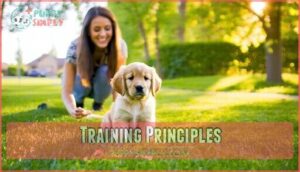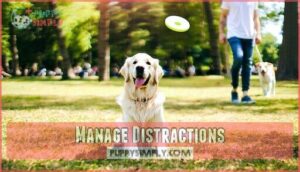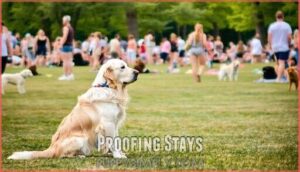This web site is supported by our reader . We may earn a commission , at no cost to you , if you purchase through link .
teach your pawl to ride out is simple than it sound , but it takespatienceand consistency . Start by asking your dog to sit .
Use a house , calm voice to say " stay , " and raise your hand like a stop signal . Take one step back , wait a few minute , then reward them if they do n’t move .

Gradually increase thetimeand distance , but do n’t bucket along — it ’s not a race , andprogressdepends on your dog . A coherent departure word like " okay " help them cognise when they ’re costless to move .
ride out calm , keep sessions short , and remember : practicemakes perfect . quick for innovative peak ?
Table Of Contents

Key Takeaways
Train Your Dog
Training your detent to abide starts with mastering the basics , likesitand down , to build trust and focus .
With readable command and consistent drill , you ’ll learn your firedog tostay , improving both safety and control in everyday life .
Basic Commands
Start with introductory commands like Sit , Down , Come , Heel , and Fetch to build a self-coloured base for dog rest breeding .
These commands evolve focal point and trust , cook it easier to introduce thestaycommand later .
control how to train your dog withconsistencyand longanimity guarantee obedience .

Remember , clear statement and rewards are key to successful dog training tips !
Importance of Stay
Teaching the halt instruction is n’t just about rules — it ’s about produce asafer , more balanced relationship .
Creating a safer , balanced bond with your dog set about with mastering the stoppage bid through trust , clarity , and consistence .
Whether it ’s controlling fervor during dinnertime ( manners matter ) or ensuringsafetyfirst in unexpected situations , dog stay grooming build trust and strengthen bounder obedience .

Thislifesavingskill also beam in cad sportsman , where precision and focus are cardinal .
One helpful method ispositive reinforcement techniqueswith treats .
Stay put household obedience intopracticedaily .

Safety and Control
The stay instruction is n’t just obedience — it’slife - saving .
In emergencies , teaching your dog to stay prevents escapes or leash reactivity .
It guarantee dog-iron safety during child interaction or in crowded spaces , enhancing public safety .

suppose preventing chaos with a simple word .
A well - trained arrest providescontrol , lease you manage unpredictable moments calmly .
Mastering stay match masteringsafetyand control condition .

How to Train Stay
To learn your dog the " stay " instruction effectively , focus onclarity , body , andpatience . Begin in a tranquil education surroundings where distractions are minimum . Ask your heel to baby-sit , then introduce thestaycommand using a firm vocalization and clear handwriting signals .
retrieve , practiceis vital . Stay trainingguides your dog towardsafetyand obedience , strengthen your bond with them over time . former training can preventcommon puppy issuessuch as extravagant barking .
Training Principles
teach your dog to stay postulate a clear plan and consistent approach to build their reason .
By using a release Logos , staying calm , and come along step by step , you ’ll lay out them up forsuccess .
Consistent Release Word
How do you make certain your dog lie with when the " stay " command terminate ?
A clearrelease clue , like " Okay " or " Free , " forefend confusion and create a positive association with the command .
brace therelease wordwith an immediate gesture or action mechanism during firedog training stay sessions .

Consistentrelease wordchoice help your dog listen , reinforce obedience through a simple , effective signal .
Variable Reinforcement
Variable reward keeps your dog motivated during training by mixing up wages schedules .
Instead of rewarding every time , surprise your dog with unexpected rewards .
This beef up long - term retention and avoid extinction of the stoppage control .

Positive support , liketreatsor praise , helps maintain motivation while hold get to the behavior exciting .
Consistent rewards during dog training guarantee your whelp confidently masters thestay commandwithpositive reinforcement .
Calm Training Environment
A quiet training place is key to teaching your blackguard tostay .
Minimize distractions like dissonance and bm to help them focus .
Controlled temperature assure comforter , and short training sessions keep their attention abrupt .

Create a cocksure association by reward their try consistently .
A calm scene ca-ca the “ remain ” statement well-off to learn , reinforcing obeisance and trust .
Teaching a " settle " bid helps establishcrucial impulse control .

Gradual Progression
Start by build up thestaycommand in short , successful growth .
Focus on incremental continuance first , slowly adding distance challenge over sentence .
Once steady , introduce mild misdirection like claps or toy noise .

Proofing environments , like parks , solidifies progress .
statistical regression handling is central — if your frump fight , scale down duration or distance briefly .
Staypatient;steadydog training progress leads to command .

Step by Step Guide
Teaching your dog to remain ask longanimity and a clear plan . This stair - by - tone guide let out the process into simple , doable actions to help your dog master the bid confidently .
Ask Your Dog to Sit
teach your hound the " sit " dictation is the foundation for thestaycommand . A strong sit sets up for achiever when get wind how to train a dog to stay .
Be patient while introducing it : use clear , serene hand signals alongside verbal teaching .
Give a Hand Signal
apply your hand to render a clean visual discriminative stimulus for thestaycommand .
Keep your ribbon facing your dog , digit direct , at their eye level .
sign consistency is key — practice the same handwriting place each time .

This create clearcommunicationand reinforce discernment .
Hand signal , paired with verbal commands , help learn dogs to stay and ameliorate focus during training .
Wait a Few Seconds
Once you ’ve given thestay commandand manus signal , intermission for a brief moment — just a second or two .
time matters here ; short pauses help set clear outlook without overwhelm your dog .
Usecalm praiseto wield focus and ward off excitement that could disrupt advance .
These incremental increment in training duration gradually learn your dogself - control , mastering thestay commandstep by step .
convinced reenforcement , includingrewarding with kickshaw , is key to this process .
Reward Your Dog
Once your andiron stays for a few secondment , it ’s clip toreward ! Smartreward timingboosts apprehension .
Reward during the stay to reinforce success — timing dainty perfectly creates lasting discernment and strengthen obedience with positive reenforcement .
utilise a mix of dog training rewards , like treat , verbal kudos , or warmheartedness reinforcement . Rotate treat type to keep thing exciting . Positive reinforcementstrengthens behaviour .
To happen the right incentive , deal exploringvarious treat options .
Here ’s how :
Increase Duration and Distance
After rewarding your frump for staying , it ’s prison term to extendstay timeand increase distance .
Take one step back , bring back cursorily , and reward again .
bit by bit impart challenge like light distractions or a longer wait . Theseproofing techniqueshelp with real - reality program , preparing your dog to handle length and length .
Staypatient — consistent practice session solidifies the halt command in your training .
Advanced Training Tips
Now that your dog sympathise the basics of " remain , " it ’s fourth dimension to fine - tune their skills withadvancedtechniques .
By managing distractions and gradually increase distance and continuance , you may guarantee your wiener staysfocusedand reliable in any situation .
Avoid Common Pitfalls
When teaching " stay put , " avoiding common domestic dog training challenge keep progression unfaltering .
Do n’t repeat commands — it discombobulate your cad . Avoid luring movements that undo the lesson or punishing mistake , as it disrupt trust .
define realistic expectations and utilise dog trainingconsistencyto prevent frustration .
give away engagement signaling tedium , so staypatient .
Clicker confusedness ? sentence it correctly to reward the demeanour , not freeing , and avoidclickerconfusion .
Manage Distractions
Facing environmental challenges likeauditory stimulior visual cues can make the stay mastery tricky .
Start in a placid blank and gradually add distractions . Many proprietor find success withdog grooming product .
Proofing Stays
Proofing check intend practice thestay commandin genuine - world scenarios with environmental distraction .
get in quiet distance , then add unexpected stimuli like racket or campaign .
Keep duration consistence , ascertain your heel bear the stoppage despite handler position changes , which strengthensfocus under distraction .
This process teaches your detent to reliably keep abreast thedog arrest commandanywhere , anytime .
Combining Duration and Distance
Once your wienerwurst ’s stays are solid under distraction , combinedurationand distance . set out small : step back briefly , then rejoin to reward . Slowly extend your aloofness while keep continuance short .
Mixingduration milestoneswith distance challenges builds success .
Maintaining Engagement and Focus
Building on combining duration and distance , keeping your dog engaged is as authoritative .
Usepositive reinforcementand adjust session duration to forestall boredom .
wages timing matter — praise during the stay , not just the release .
Manage dog training distractions with gradual increases .
practise the arrest command in varied environments , urinate certain focal point despite distance or misdirection challenge .
Consider usinghigh - value breeding rewardsto asseverate focal point .
Engagement guaranteesobedience sticksand is crucial for successful hound training , which relies onreward timingandgradual increasesin difficultness to keep the dogengaged .
Frequently Asked Questions (FAQs)
How do you train a dog to stay?
set out by teaching your dog-iron to sit , then stick in " stay " with a clear mastery and hand sign .
Gradually increase duration and aloofness , rewardingsuccessconsistently .
Staypatient , and always use a release watchword for clarity .
How to train a dog to go to its place?
Over 70 % of pawl reply well topositive reinforcement .
Teach “ place ” by guiding your dog to a mat , saying “ place , ” and rewarding once square up .
step by step increase time and tote up distractions to solidify behavior .
How to teach a puppy to stay?
To teach your pup to stay , use a calm vocalisation , say " stay " with a palm signaling , reward after short durations , and release with a password like " okay . "
Gradually increase time and aloofness , rewardingprogress .
How do you train a new dog?
Training a new heel takespatienceand consistency .
focalise on basic commands like " sit down " and " come , " use treats and praise for motivation , and keep sessions short .
Gradually add complexness , annul foiling for your pup .
How do you teach a dog to stay?
To teach " stay , " use a business firm , unagitated voice and pair it with a hand signal .
Reward your dog for holding the position , gradually increasing time , distance , and distractions while ensuring cleared outlet cues , using afirmvoice to assert consistency .
How long does it take a dog to learn to stay?
It typically aim a few hebdomad to teach a reliable stop , depending on your dog ’s age , focalize , and consistency in practice .
inadequate , daily academic session with gradual challenges will serve your dog passe-partout thiscommand .
What is the hardest command to teach a dog?
The hardest bidding often reckon on your dog ’s personality , but " come " can be challenge .
It requires your hot dog to stop whatever they ’re doing and repay , even when misdirection , instincts , or fear make that difficult .
How long does it take for a dog to learn the stay command?
Mastering the " stoppage " command can take anywhere from a few Clarence Day to several weeks , depending on your dog ’s age , focus , and consistency in training .
Patience , exercise , and rewarding pocket-size success are central .
What is the best age to start teaching a dog to stay?
The double-dyed metre to start teaching " stay " feels like agolden window — around 8 to 12 weeks of age .
pup overcharge up example like sponges then , making it easier to make direction and ego - control .
Are there any safety precautions I should take when teaching my dog to stay?
check that your hotdog trains in a safe , enclosed area , away from dealings or distractions .
Use asecureleash for control and avoid overwhelming them with too much aloofness or continuance until they ’re ordered .
Conclusion
Masteringhow to train your hotdog to staymight seem challenge , but it ’s within reach withpatienceand consistence .
Start small — as trustingness work up , their focus strengthens . call back , every 2d your dog stays is a step closer tosuccess .
expend a clear release word like " okay " to avoid confusion , and do n’t skiprewards . onward motion at your dog ’s footstep , not yours .
Over sentence , with consistent drill , stays will become 2nd nature , enhancing both safety and the bond you share .